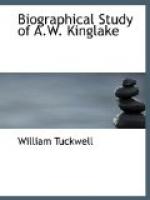The intellect of this strange being was subject to an uncertainty of judgment, issuing in ambiguity of enterprise, and giving an impression of well-kept secrecy, due often to the fact that divided by mental conflict he had no secret to tell. He understood truth, but under the pressure of strong motive would invariably deceive. He sometimes, out of curiosity, would listen to the voice of conscience, and could imitate neatly on occasion the scrupulous language of a man of honour; but the consideration that one of two courses was honest, and the other not, never entered into his motives for action. He was bold in forming plots, and skilful in conducting them; but in the hour of trial and under the confront of physical danger he was paralysed by constitutional timidity. His great aim in life was to be conspicuous—digito monstrarier— coupled with a theatric mania which made scenic effects and surprises essential to the eminence he craved.
Handling this key to his character, Kinglake pursues him into his December treason, contrasts the consummate cleverness of his schemes with the faltering cowardice which shrank, like Macbeth’s ambition, from “the illness should attend them,” and which, but for the stronger nerve of those behind him, would have caused his collapse, at Paris as at Strasburg and Boulogne, in contact with the shock of action. It is difficult now to realize the commotion caused by this fourteenth chapter of Kinglake’s book. The Emperor was at the summit of his power, fresh from Austrian conquest, viewed with alarm by England, whose rulers feared his strength and were distrustful of his friendship. Our Crown, our government, our society, had condoned his usurpation; he had kissed the Queen’s cheek, bent her ministers to his will, ridden through her capital a triumphant and applauded guest. And now men read not only a cynical dissection of his character and disclosure of his early foibles, but the hideous details of his deceit and treachery, the phases of cold-blooded massacre and lawless deportation by which he emptied France of all who hesitated to enrol themselves as his accomplices or his tools. Forty years have passed since the terrible indictment was put forth; down to its minutest allegation it has been proved literally true; the arch criminal has fallen from his estate to die in disgrace, disease, exile. When we talk to-day with cultivated Frenchmen of that half-forgotten epoch, and of the book which bared its horrors, we are met by their response of ardent gratitude to the man who joined to passionate hatred of iniquity surpassing capacity for denouncing it; their avowal that with all its frequent exposure of their military shortcomings and depreciation of their national character, no English chronicle of the century stands higher in their esteem than the history of the war in the Crimea.




